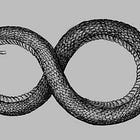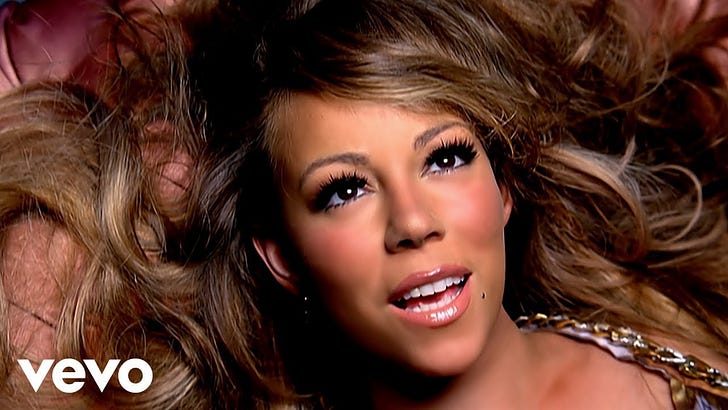🤥 My Most Toxic Trait, Part One
On my quest to follow Cheryl Strayed's advice: "Aspire to credibility, not likability."
This post has a soundtrack . . . from the 1999 teen rom-com 10 Things I Hate About You:
“I want you to want me / I need you to need me / I love you to love me”
—Cheap Trick’s lyrics, covered by Letters to Cleo
One of the biggest sources of my writer’s block is you. Not the real you, just the fake you that I perceive to be judging me. When I worry about what you’ll think of me, I freeze. (And fawn, and flop.) What I don’t do is write.
What a sensitive little snowflake. If I could wave a magic wand and make that fear disappear, I might—but then again, I might transform into an intolerable delulu princess, and I don’t want that either.
Still, craving approval is one of the more toxic traits wreaking havoc in my life.
The insight landed as another song-as-memo download, earworming into my brain to indicate my inner state. Before I write, as soon as I post, and after a post goes live, I think to myself, 🎵 “I waaaant you to like me, I neeeed you to need me.” This is not helpful for good writing, and certainly not for personal essays, which require unvarnished truth.
During a three-day “Wild Awakenings” writing workshop in Rhinebeck just before my 41st birthday last year, Cheryl Strayed called us forth in the opening session, right there on the first slides in big plain black text on a white background:
Dare to show us your wildest self. Not who you are, but who you are REALLY.
“Aspire to credibility, not likability,” she said, firing new permission-slip synapses in my mind. “Go all the way to the ground level until you tell the truest thing.”
Cheryl taught us to think of personal writing like lasagna: look at it from the side, that multi-layered cross-section of noodles and béchamel and cheese. Our writing must go deeper than the surface. “Stories move forward, but they also must move along the vertical dimension,” she said, as we excavate new layers of self-awareness and truth, even the shadow sides we try to hide. She continued:
[This process] does the work literature aims to do: tell the truth about who we are.
Yes, there’s criticism, but the majority is: me too, thank you; you speaking truth about your life allows me to do the same. I am human like you.
Your job, as the writer, is to be the illuminator. Go where the light leads you—into the darkest, scariest places.
Dramatize your truest insights.
Risk being “too much.”
Being brave will make you braver.
Too often, I make the toxic tradeoff of braveness and truth for (perceived) safety. As with most coping mechanisms, this probably helped growing up. But now it results in never-ending mental spin cycles that stop me from becoming who I am meant to be. Much of that manifests here on Doh, because this is the most real I’ve been online, and not everyone likes it. Nor should they!
Why do I care if you like me? So that you will stick around, so you’ll be pleased with me, so you’ll tell your friends, so you will comment and “like,” so you will award gold stars for jobs well done, so you will hold me in high regard, so you will respect me.
Why do these things matter? Survival instinct to stay part of the tribe, except that, “at some point in our lives we meet a place where being likeable, flexible, easy, and affable becomes suffocating,” writes Javanne Golob in The Paradox of Being Likable. “Instead of helping us thrive, it results in pathology.”
If I’m unlikable, the dreaded descriptor (most often lobbed at women), then what? You might leave—or only stick around out of gleeful schadenfreude ribbing my very unlikeability, the way I enjoy yelling at people on TV making terrible life decisions in reality dating shows like 90-Day Fiancé: The Other Way.
My neurosis could stem from what L. calls “eldest daughter syndrome” (all the lightbulbs went off when I read this piece), appeasing the adults around me who seemed stressed, exacerbated by my existence. How could I make life easier for them? Be good. Be likable. Hide until they’re happy again.
“It’s not a diagnosis, but a condition of existence,” L. writes. “You become the one who keeps things from falling apart, even when you’re crumbling inside.”
In honor of the now-classic 26-year-old flick (RIP Heath Ledger), allow me to present:
🙄 10 Things I Hate About (Wanting to Be Liked By) You
It’s a lie—and it’s lying. In her canonical book, Codependent No More, Melody Beattie calls people-pleasing lying. What?! That was news to me when I first read it a decade ago. I thought pleasing others was polite; it made me agreeable. Tsk tsk. Terri Cole, author of Boundary Boss and Too Much, puts it this way: being agreeable to avoid conflict isn’t nice, it’s controlling; manipulative, even. If I prioritize you liking me above all else, it means projecting a false image over sharing what’s true, over-functioning to control your reactions (impossible), keeping the peace instead of saying what I really think. It means wearing a mask, shapeshifting to become who I perceive you might want me to be. It is cloying, exhausting, and unsustainable.
It makes me anxious before, during, and after publishing (including this post). Perhaps I revealed something about myself that I haven’t said publicly before; will this new factoid be the one that has you jamming unsubscribe? Wanting to be liked makes me soft, and not in a good way. I feel bruised by less-than-positive feedback, or even by well-meaning commenters misunderstanding or judging me. Even if a post isn’t objectively “bad,” (can’t we all have different taste for crying out loud?!) I still struggle not to feel bad when something is less well-received by others than I hoped.
This, in turn, creates pressure to publish an escalating level of “bangers,” each post (or book) needing to surpass the last in terms of resonance, reach, responses, sales, income, etc. This is also unsustainable, and unrealistic.
It’s boring. Wanting to be liked produces milquetoast work. Yes, milquetoast is a pretentious word, but it so perfectly captures the vibe: “a timid or feeble person, insipid or bland.” It would mean papering over my problems, insecurities, and doubts, pretending to be more enlightened than I am. I admire memoirists who write with unflinching honesty, like Meghan Daum’s latest book of essays, Catastrophe Hour, and Stephanie Foo’s What My Bones Know.
It’s sticky, like fly paper. Due to the negativity bias hardwired into our brains, I hate that other people’s words and one-star reviews stick to my mind like mosquitoes on bug-trapping sheets, especially when I sit down to write something new. It’s probably because, on some level, I worry they are right. Quit while you’re (not) ahead. I’ve been writing twice weekly here for nearly two years, and this impulse to shut it all down so I can feel safer still bubbles up on a daily basis. Should I throw in the towel on the whole thing? But deep down in those lasagne layers, I know that wouldn’t be the bravest route. I would only be hiding again, including from myself. Hoping—helplessly, fruitlessly—that you’ll like (the fake) me.
❤️
Continue reading reasons six through ten in part two . . .1
And my update to this series, published three months later:













Oh Jenny, the very idea that anyone could not like you. Your posts have been such a balm to my heart and my anxiety - to know I am not alone, a reminder to write from the heart, showing my full self. Because when YOU do, your people, your community shows up. We don’t always hear the applause but it’s there. We might not always get the heart but there is as much love in the reading as in the writing. And please, whenever you find those gremlins getting loud please know that you have changed my life for the better and continue to do so with every post.
You're sooo not alone in your plight. It's tough not to care and so important to care at least a little. Balance is a bitch and so is living in the silence of the void after pressing 'Publish'. Thank you for living your truth, even when it feels a little needy and not-so-true.